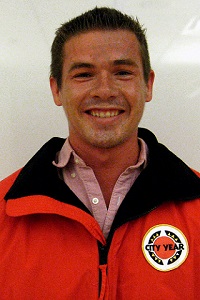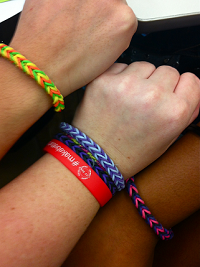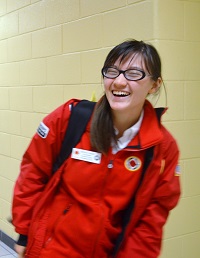By Lucas Holmes, corps member serving on the PTC team
“You have two minutes to focus,” Mr. McDonald tells his students in the hallway before entering the classroom. Consistent and clear expectations are one of the keys to Mr. McDonald’s success as an English as a second language (ESL) teacher at Dearborn School.
With a large percentage of ESL students attending Dearborn School, Mr. McDonald fills a significant and much needed role for the school. McDonald recognizes this, working tirelessly to improve the English of these English language learners.
Having the privilege to serve alongside Mr. McDonald this school year, I am fortunate to get to know him and his students. Patience, positivity, and warmth emanate from Mr. McDonald in the classroom, and students respond with an equal amount of respect and focused energy. Although Mr. McDonald’s students face a unique challenge compared to their native English-speaking peers, Mr. McDonald sees their potential to learn as equal, if not greater.
Mr. McDonald’s faith in his students was evident at the beginning of the year when Mr. McDonald worked with them to set an achievable goal of growth for their reading. Instead of setting a goal based on experience from teaching previous years, Mr. McDonald asked the students how much they wanted to grow by the end of the year and let the students decide on the number of words per minute (WPM) by which they wanted to improve.
The students eagerly set their own ambitious goals. With some guidance, Mr. McDonald and the students agreed on the goal of growing 100 WPM by the end of the year; a goal that Mr. McDonald knew would be a challenge to achieve, but certainly possible if the class worked extremely hard. With the students’ goal in mind, Mr. McDonald crafted expectations and lessons to help students meet their goal, requiring 20 minutes of reading per night.
To keep students accountable, Mr. McDonald visually displays the WPM of each student for each beginning and end of month to track the progress of his students. The growth of the class is apparent, but the display also shows that growth does not come easily.
Even though the rate of growth may not be on pace for the end goal of 100 WPM, this should not be a reason for discouragement. Students are encouraged by the fact that they set high expectations for themselves; it means they were willing to risk failure for the sake of pushing themselves to grow as much as they can. Regardless of whether or not the students reach their goal at the end of year, surely Mr. McDonald and I will be proud of the progress that they make.
About the author:
Lucas Holmes is a 2013-2014 corps member serving on the PTC team at Dearborn School in Roxbury.






